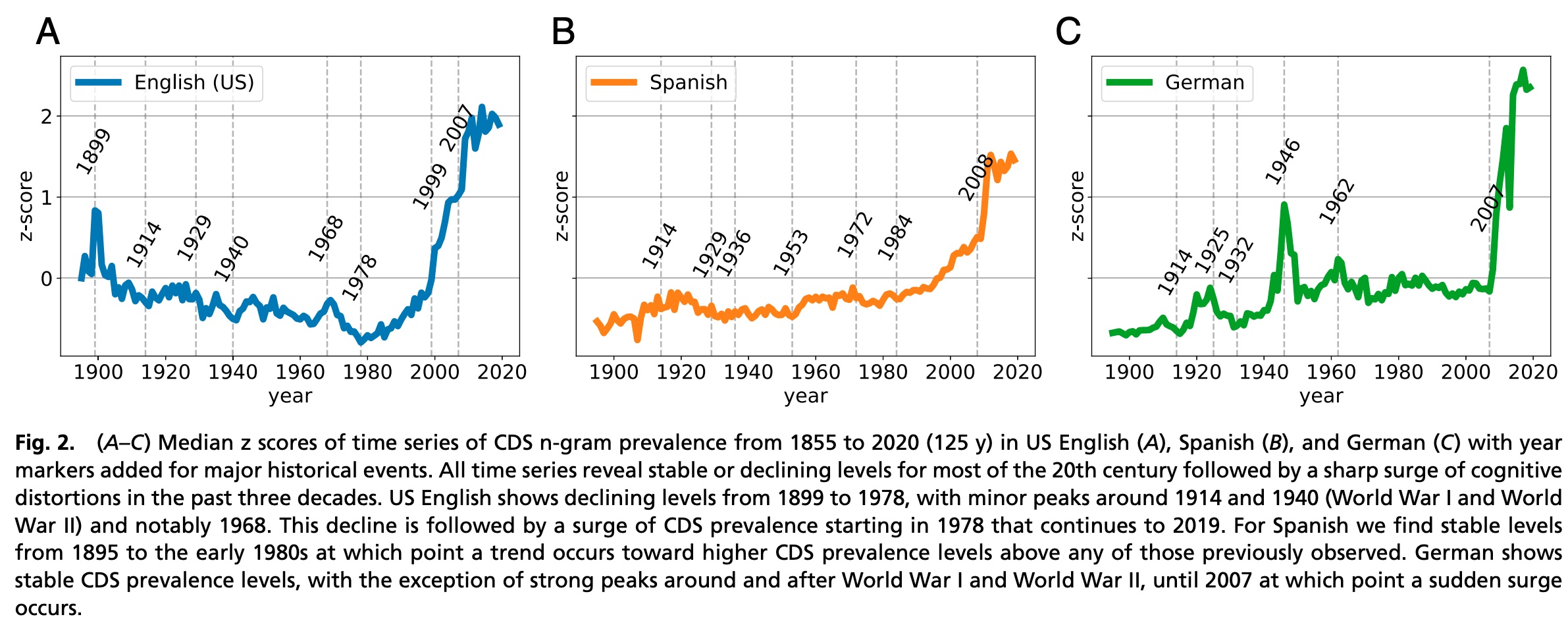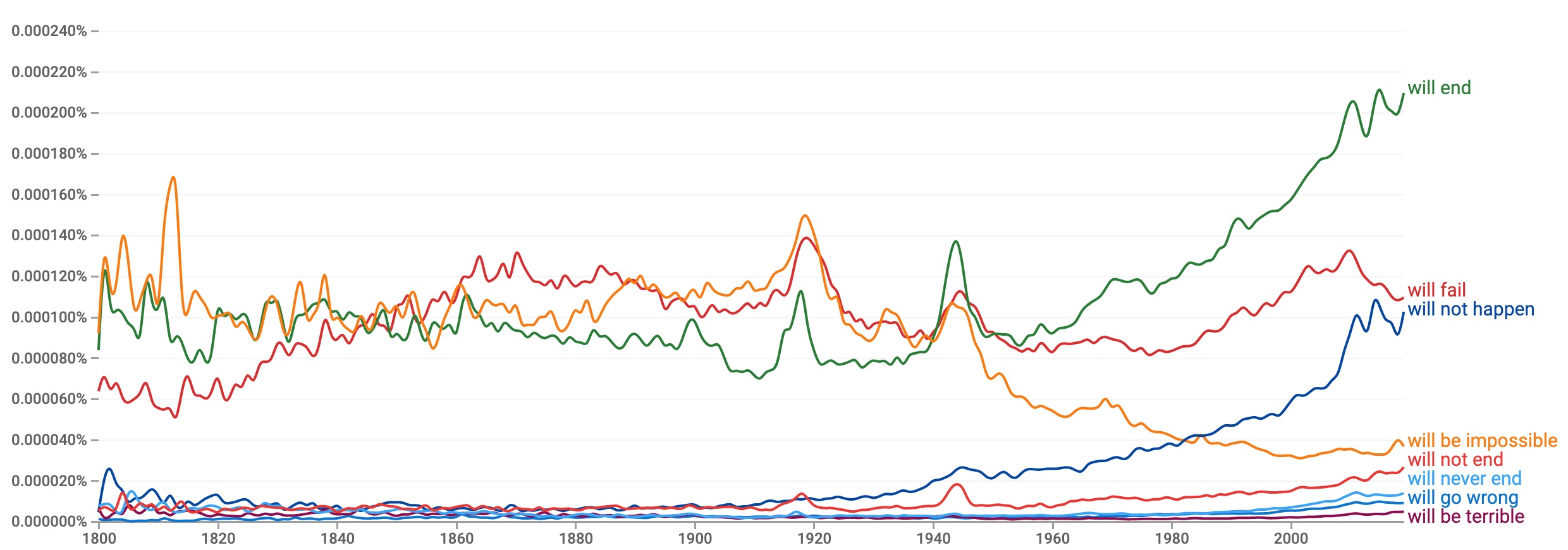August 06, 2021
Global Catastrophizing
Do you think the world is much darker than it used to be? If so, you are not alone.
I have always assumed that a feeling of psychological decline is just a side-effect of getting older. But a paper by Bollen, et al., out in PNAS today suggests that a darker outlook in recent years might not be specific to any of us individually. By analyzing trends in published text in the Google ngrams corpus, researchers from Indiana University and Wageningen have discovered that across English, Spanish and German, text published in the world shows sudden changes in language use over time that are indicative of cognitive distortions and depression, coinciding with major wars or times of social upheaval.

The chart above is from Bollen's paper, and it counts something very simple. For every year, it counts how many times a particular set of short phrases appear in the printed books published in that year. The annual counts come from Google's Books ngram corpus - derived from scans of published books - and the 241 phrases counted are word sequences chosen by a panel of cognitive behavioral therapy specialists as markers for cognitive distortion schemata (CDS). That is, they are phrases that would suggest systematic errors in thinking that are correlated with mental health issues that are treated by psychologists.
For example, one of the 241 counted phrases is "you always," because those words often indicate overgeneralization such as in the sentences "You always say no," or "You always win." The bigram "everyone knows" indicates mind-reading, because it reveals that the speaker has a belief that they know what other people are thinking. The trigram "will never end" indicates catastrophizing, an exaggerated view of negative events. In total the panel of experts cataloged each of the 241 selected phrases, as a marker for a dozen specific cognitive distortions. These cognitive distortions are correlated with depression, so it is interesting to ask whether large-scale trends in the usage of these phrases reveals mass changes in psychology over time.
The chart suggests that it might. It seems to reveal suffering in Germany coinciding with World Wars I and II, and trauma in the English-speaking world at the Spanish-American War, Vietnam war protests, and 9/11. Strikingly and worryingly, all the languages show a dramatic increase in cognitively distorted use of language since 2007. If you believe the linguistic tea leaves, our collective state of mind seems to have taken an extraordinary turn for the worse in the last decade — globally.
The paper is an example of a use of the Google Books ngrams corpus. This is a pretty great resource that catalogs language use by counting words and ngrams in about 4% of all published text, by year, and it means that you can easily look further into the data yourself. The authors provide their list of phrases, so you can examine the trends by individual category and phrase. Here are the top phrases for catastrophizing in English:

Explore and modify the query yourself here. You can see spikes in certain phrases corresponding to WWI and WWII, and the upwelling, in recent decades, of expressions of the idea that a variety of things "will end" and "will not happen".
It is when the 241 phrases are added together, when we see dramatic recent spikes that are reminiscent of the climate change hockey stick plot by Mann, Bradley and Hughes.
Do you agree with the authors that these changes in word usage are meaningful? Have we been experiencing a catastrophic worldwide decline in psychological health since 2007?
Or is this just an example in which the authors themselves are catastrophizing, looking at data in a way that interprets events in the world as much worse than they actually are?
Previous musings on society-wide catastrophizing here.
August 24, 2021
PhD Defense
Today I did my PhD defense, and my talk will be posted here on youtube. Here is the talk!
Title: Dissection of Deep Networks
Do deep networks contain concepts?
One of the great challenges of neural networks is to understand how they work. Because a deep network is trained by an optimizer, we cannot ask a programmer to explain the reasons for the specific computations that it happens to do. So we have traditionally focused on testing a network's external behavior, ignorant of insights or flaws that may hide within the black box.
But what if we could ask the network itself what it is thinking? Inspired by classical neuroscience research on biological brains, I introduce methods to directly probe the internal structure of a deep convolutional neural network by testing the activity of individual neurons and their interactions.
Beginning with the simple proposal that an individual neuron might represent one internal concept, we investigate the possibility of reading human-understandable concepts within a deep network in a concrete, quantitative way: Which neurons? Which concepts? What role do concept neurons play? And can we see rules governing relationships between concepts?
Following this inquiry within state-of-the-art models in computer vision leads us to insights about the computational structure of those deep networks that enable several new applications, including "GAN Paint" semantic manipulation of objects in an image; understanding of the sparse logic of a classifier; and quick, selective editing of generalizable rules within a fully trained StyleGAN network.
In the talk, we challenge the notion that the internal calculations of a neural network must be hopelessly opaque. Instead, we strive to tear back the curtain and chart a path through the detailed structure of a deep network by which we can begin to understand its logic.
August 25, 2021
Assistant Professor at NEU Khoury
I am thrilled to announce that I will be joining the Northeastern University Khoury College of Computer Science as an Assistant Professor in Fall 2022.
For prospective students who are thinking of a PhD, now is a perfect time to be thinking about the application process for 2022. Drop me a note if you have a specific interest in what our lab does. And if you know somebody who would be a fit, please share this!
http://davidbau.com/research/
https://www.khoury.northeastern.edu/apply/
We think that understanding the rich internal structure of deep networks is a grand and fundamental research question with many practical implications. (For a talk about this, check out my PhD defense). If this area fascinates you, consider applying! The NEU Khoury school is in downtown Boston, an exciting, international city, and the best place in the world to be a student.